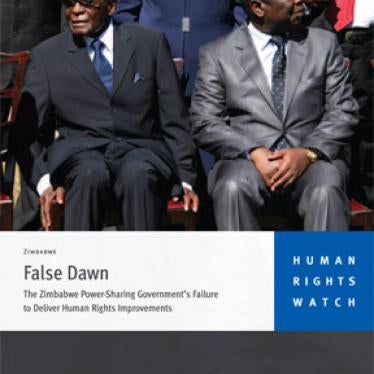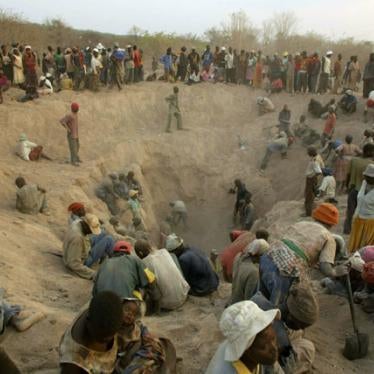(Johannesburg) - Zimbabwe's power-sharing government has made no real progress in implementing political reforms and ending human rights abuses after a year in office, Human Rights Watch said today. The government has demonstrated little political will or capacity to enact meaningful changes to improve the lives of Zimbabweans.
Human Rights Watch urged the government to take immediate steps to end abuses and create the necessary constitutional and electoral framework to ensure free, fair, and credible elections, as envisaged in the Global Political Agreement, which established the power-sharing government.
"The transitional power-sharing government is a sham," said Georgette Gagnon, Africa director at Human Rights Watch. "From a human rights perspective, nothing has changed for the better. Robert Mugabe and ZANU-PF are still fully in control."
The Global Political Agreement, which took effect on February 11, 2009, was approved in September 2008 by the Zimbabwe African National Union - Patriotic Front (ZANU-PF), the longtime ruling party led by Mugabe and by the Movement for Democratic Change (MDC), the former opposition. It was designed to resolve Zimbabwe's political and economic crisis and chart a new political direction for the country.
Recent research by Human Rights Watch in Zimbabwe suggests that there has been no meaningful political transition, and that ZANU-PF continues to engage in political violence against perceived opponents. Groups of war veterans and ZANU-PF youth, who have been deployed in the past to target the opposition, remain intact. ZANU-PF still uses elements in the security forces as instruments of repression. Military-led violent invasions of commercial farms continue.
In the first week of February 2010, police disrupted MDC-organized constitutional reform meetings, beat up participants, and arbitrarily arrested 43 people in Binga, 48 in Masvingo, and 52 in Mt. Darwin.
Although the Global Political Agreement recognized the importance of the rights to freedom of expression and communication, the media in Zimbabwe remain muzzled. There are no private daily newspapers or privately owned radio stations. Public information remains under the firm control of ZANU-PF.
Not one license for independent media outlets has been issued since the power-sharing government was formed. A Bulawayo-based community radio initiative, Radio Dialogue, released a press statement on February 4 saying that it had the equipment and staff necessary to start broadcasting immediately, but that the government had failed to provide a broadcasting license.
Journalists in Zimbabwe face intimidation and arrest for appearing to oppose ZANU-PF. On January 16, a freelance journalist, Stanley Kwenda, fled to South Africa, saying he had received death threats from a senior police officer. Two days later, another freelance journalist, Andrison Manyere, was arrested while filming a public demonstration organized by Women of Zimbabwe Arise (WOZA). Police detained him for over six hours before releasing him without charge.
ZANU-PF continues to use its control of state-owned print and electronic media to manipulate public opinion in its favor while using hate speech and other offensive language against MDC. Without an open media environment, Zimbabweans will be unable to participate fully in the ongoing constitutional reform process or in future elections, Human Rights Watch said.
In these and other areas, ZANU-PF has resisted complying with the rule of law. It even declared at its December 2009 party congress that it would not allow security forces to be subjected to reform. The security sector is deeply embedded in the political affairs of the country.
Diamond revenue, particularly from the Marange diamond fields in eastern Zimbabwe, is providing a parallel source of revenue for ZANU-PF and its repressive machinery, Human Rights Watch said. Companies with connections to ZANU-PF are mining diamonds in Marange, where military control and abuses continue.
Human Rights Watch called on the government to allow newspapers and electronic media to operate freely and to carry out other confidence-building reforms. It should repeal all repressive legislation such as the Public Order and Security Act (POSA), which severely limits rights to demonstrate and criminalizes "insulting" the president of Zimbabwe and publishing "inaccurate" information. These provisions have been used to harass, arrest, and prosecute journalists. Furthermore, the police have loosely interpreted certain provisions of the POSA to justify arbitrary arrests.
Even on issues where there is consensus between ZANU-PF and MDC, such as the appointment of new provincial governors, implementation has been stalled, and the parties continue to bicker about the delay.
To divert scrutiny of the continuing political instability and the failure to carry out the agreement, parties in the power-sharing government instead overemphasize the significance of efforts made to stabilize the economy, Human Rights Watch said.
Human Rights Watch called for parties to the government to begin preparations for holding internationally supervised free, fair, and credible elections that will lead to a legitimate and democratic government with the political will to bring about change.
"The power-sharing government experiment is not working," Gagnon said. "Without political stability and rights reforms, any progress on economic recovery won't last."








